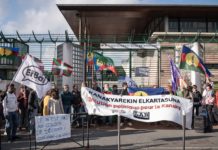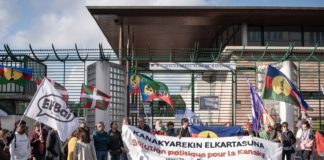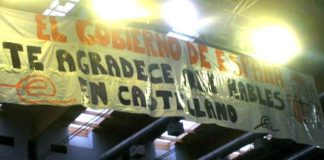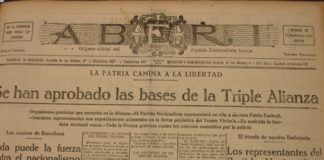National liberation processes are usually long and difficult. And some, unfortunately, also dramatic and bloody. If we look at the process of creating the states that have been born in Europe over the last 40 years, we will realize that some nations have completed their self-determination without a long conflict (Estonia, Latvia, Montenegro…) while in others that process has been much more conflictive (Croatia, Kosovo, Georgia…). In any case, the processes of national liberation have not been easy anywhere, since the states always erect all kinds of obstacles in front of the nations they subdue and political independence has been achieved only through disobedience and after a hard clash (bloody or not) with the State.
In the Basque Country, the struggle for independence – over the last 60 years – has developed to a large extent under the influence of the ETA organization (and linked to ETA above all, despite there existing other independentist political agencies that rejected the armed struggle). In 2018 ETA announced its dissolution, without having achieved any of its strategic objectives (self-determination, the re-unification of the Basque Country, amnesty for its prisoners…). To put it clearly, Spain – using all the machinery of a State, including totally anti-democratic and perverse instruments – imposed itself on the Basque armed organization. It is not usual among us, the Basques, to say things so clearly, but we believe that it is essential to speak bluntly in order to understand the current Basque political situation and the demobilization of our society. After the disappearance of ETA, the Basque independentist left has re-positioned itself within the new political scenario, while the strategic objectives of yesteryear, which it always firmly defended, have now moved to the background in its political discourse, as if those objectives were now an obstacle to achieving political hegemony. As a consequence, our national pulse has weakened remarkably. We do not believe we are wrong if we say that at a national level in Basque society one can perceive fatigue, apathy, a worrying reluctance, a total lack of hope. The political and cultural dynamism that existed at the end of the 20th century and at the beginning of the 21st has weakened considerably in the Basque Country under Spanish domination (the same has not happened in the Northern Basque Country, where civil society still maintains a high capacity for mobilization)
It could be said that nations, like people, have their own ups and downs of mood, variable and cyclical moods. Moments of hope and moments of frustration. In nations with a strong personality, from a sociological point of view, society does not show profound changes over time in terms of its national sentiment, but it does exhibit difficulties in keeping a national liberation process alive for a long time, if that process has not been completed successfully. Because the distance between hope and frustration is short in the processes of national independence.
Quebec is a case in point. There, the question of independence was fully topical during the decades of the 80s and 90s of the 20th century. The strength of the independence movement made it possible to call two self-determination referendums, the last one in 1995, which the opponents of independence won by a very narrow margin (50.58% of the votes against independence and 49.2% in favor). Twenty-seven years have passed since and the independence movement has been greatly weakened there. After the independence cycle, Quebec has returned to the autonomist cycle, and the discussion about sovereignty has moved to the background of the political agenda. The dismal result achieved in the last elections by the main pro-independence political party (Partit Québécois) is significant, its worst historical result, from which the autonomists (Coalition Avenir Québec) have benefited. It is evident that the Quebecois independence movement has not yet been able to accept the failure of 1995, and this collective frustration has notably harmed it. Polls also show that support for independence has weakened greatly among Québec citizens, and that support is far from what it was in the 1980s.
The case of Catalonia is also paradigmatic. There the great wave of independence showed its strength between 2012 and 2017, especially. Since October 2017, however, and after missing the opportunity to declare unequivocally its independence, disappointment prevailed over hope and the independence fever weakened. In observing this we do not want to say, far from it, that we consider the independence process in Catalonia to be at an end, as the Spanish would have us believe. The sociology of the Catalan population has not changed overnight. But it is evident that the Catalan process has entered a new cycle, and even more so since a sector of the independence movement has adopted a more “pragmatic” position and has set aside the unilateral path, committing a great strategic error in our opinion.
If the current “impasse” of the Catalan independence process becomes chronic, what has happened in Québec or the Basque Country could happen: that the feeling of disappointment spreads, firstly, and of frustration, later. And along with it, a general demobilization. Well, as has been said, it is difficult to maintain the mobilization capacity for long years if satisfactory political results are not achieved. In the Basque Country, unfortunately, we know this phenomenon very well.
Two thoughts with which to conclude:
First: although it is true that the independence movement in Québec has lost strength in recent years, Québecois society has made great strides in the field of national construction: 95% of the population speaks French, and the number of monolinguals in French is the highest ever reached: 53%. In the Basque Country, on the other hand, together with the decline of the independence movement, Basque national consciousness is also weakening, and there is much evidence that the process of our assimilation in Spain and France is accelerating. Our national crisis, then, is twofold and if we do not react quickly, we will soon reach a point of no return.
Second: we must not fall into despair. Like Québec or Catalonia, Euskal Herria (the Basque Country) is a nation with a strong personality, which has survived for many centuries. In its long history, it has overcome much stronger crises than the current one. We have no doubt that it will emerge stronger from the current political lethargy, when the spark is struck that again ignites our national sentiment. Let’s work together to ignite that spark!!








